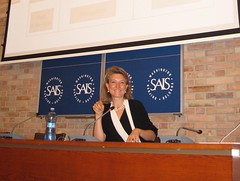 One of the overarching discussions that has permeated almost every session in this course so far is the question of how a balance between peace and justice can or should be struck in a peace process. We’ve moved through a range of perspectives during the lectures, starting last week with the views of mediators like Joyce Neu and Jeffrey Mapendere, who emphasised the need to secure peace, understood here as the end of armed hostilities, before discussions of justice, particularly retributive justice, should be entered into. This very pragmatic view initially challenged some of the ideas I came into the course with, which put justice as a cornerstone of peace that ought to be at the forefront of every peace process. However, quite fairly they argued that a central concern in any negotiated peace process has to be to get armed groups to put their weapons down – if this means that key leaders have to be assured that they will not be prosecuted for crimes committed during the war, then so be it.
One of the overarching discussions that has permeated almost every session in this course so far is the question of how a balance between peace and justice can or should be struck in a peace process. We’ve moved through a range of perspectives during the lectures, starting last week with the views of mediators like Joyce Neu and Jeffrey Mapendere, who emphasised the need to secure peace, understood here as the end of armed hostilities, before discussions of justice, particularly retributive justice, should be entered into. This very pragmatic view initially challenged some of the ideas I came into the course with, which put justice as a cornerstone of peace that ought to be at the forefront of every peace process. However, quite fairly they argued that a central concern in any negotiated peace process has to be to get armed groups to put their weapons down – if this means that key leaders have to be assured that they will not be prosecuted for crimes committed during the war, then so be it.
For instance, when Joseph Kony of the Lord’s Resistance Army (LRA) demanded an amnesty as a precondition for entering into peace negotiations, even the communities most affected by the LRA’s atrocities in Northern Uganda supported granting his demand, because they saw it as a necessary concession in the interests of peace. The problem was that during the peace process the International Criminal Court (ICC) issued an arrest warrant for Kony on account of the war crimes and crimes against humanity he has orchestrated during the conflict, and consequently he has essentially refused to participate in peace negotiations.
This is a seriously contentious issue in the field of conflict resolution, especially given that the international community has put so much effort into developing norms around international law, human rights, the protection of civilians, and justice. Can we, or should we, sometimes put these norms aside in the interests of securing the end to a conflict?
It’s also been the source of many discussions, both inside the classroom and out, especially since Thursday’s presentation by Dr. Rod Rastan, a legal advisor to the Prosecutor of the ICC. His seminar challenged a lot of our underlying assumptions about the role of the ICC in the international peace and security arena – especially those that saw the ICC as just one cog in the broader peace and security machine; a cog that should work collaboratively with all others.
Dr. Rastan argued that the ICC operates in a different, albeit linked, sphere to peace-makers and peace-builders. His presentation was particularly interesting in that he shifted key questions away from the pragmatism of just ending violence to focus on the broader issues of developing and maintaining international legal norms of justice, human rights and protection of civilians. Basically, his position was that even if this makes peace more difficult to achieve in the short term, it will result in a stronger and fairer peace in the longer term.
 Friday’s session on reconciliation with Valerie Rosoux changed the dynamics of this debate about peace and justice again, focusing on the issue of reconciliation, and the needs of the victims of violent conflict. Is retributive justice essential to reconciliation, or is restorative justice more so? Should the focus be on international standards of justice, or on what is most constructive for those affected by the conflict?
Friday’s session on reconciliation with Valerie Rosoux changed the dynamics of this debate about peace and justice again, focusing on the issue of reconciliation, and the needs of the victims of violent conflict. Is retributive justice essential to reconciliation, or is restorative justice more so? Should the focus be on international standards of justice, or on what is most constructive for those affected by the conflict?
All these discussions have highlighted the complexities of peace processes, and demonstrate the need to find new, creative and multifaceted approaches that satisfy the competing demands of peace, justice and reconciliation. The international community has to start thinking outside the box if we’re going to successfully respond to the challenges posed by contemporary civil wars.
Jasmine-Kim Westendorf, Australia

